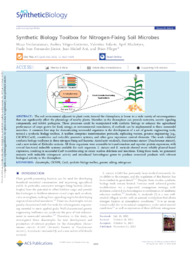Synthetic biology toolbox for nitrogen-fixing soil microbes.
Synthetic biology toolbox for nitrogen-fixing soil microbes.
Author(s): VENKATARAMAN, M.; YN?IGEZ-GUTIERREZ, A.; INFANTE, V.; MACINTYRE, A.; FERNANDES JUNIOR, P. I.; ANÉ, J.-M.; PFLEGER, B.
Summary: The soil environment adjacent to plant roots, termed the rhizosphere, is home to a wide variety of microorganisms that can significantly affect the physiology of nearby plants. Microbes in the rhizosphere can provide nutrients, secrete signaling compounds, and inhibit pathogens. These processes could be manipulated with synthetic biology to enhance the agricultural performance of crops grown for food, energy, or environmental remediation, if methods can be implemented in these nonmodel microbes. A common first step for domesticating nonmodel organisms is the development of a set of genetic engineering tools, termed a synthetic biology toolbox. A toolbox comprises transformation protocols, replicating vectors, genome engineering (e.g., CRISPR/Cas9), constitutive and inducible promoter systems, and other gene expression control elements. This work validated synthetic biology toolboxes in three nitrogen-fixing soil bacteria: Azotobacter vinelandii, Stutzerimonas stutzeri (Pseudomonas stutzeri), and a new isolate of Klebsiella variicola. All three organisms were amenable to transformation and reporter protein expression, with several functional inducible systems available for each organism. S. stutzeri and K. variicola showed more reliable plasmid-based expression, resulting in successful Cas9 recombineering to create scarless deletions and insertions. Using these tools, we generated mutants with inducible nitrogenase activity and introduced heterologous genes to produce resorcinol products with relevant biological activity in the rhizosphere.
Publication year: 2023
Types of publication: Journal article
Unit: Embrapa Semi-arid Region
Keywords: Biologia sintética, CRISPR, Caixa de ferramentas, Cas9, Edição de genoma, Genome, Nitrogenase, Solo, Synthetic biology
Observation
Some of Embrapa's publications are published as ePub files. To read them, use or download one of the following free software options to your computer or mobile device. Android: Google Play Books; IOS: iBooks; Windows and Linux: Calibre.
Access other publications
Access the Agricultural Research Database (BDPA) to consult Embrapa's full library collection and records.
Visit Embrapa Bookstore to purchase books and other publications sold by Embrapa.

